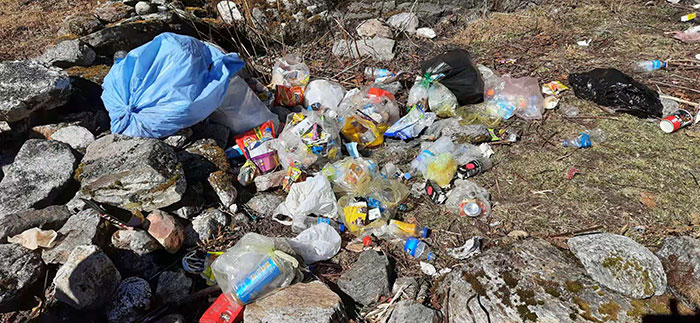
Garbage dumped on the way to Dragay Phangtsho (Photo: Phub Tshering)
Choki Wangmo
Rapid growth of star and budget hotels besides, development of tourism in the country can perhaps be best understood from amount of waste generated from tourism-related services.
Local tourism boom is adding to the problem, taking waste to the serene lakes and mountain trails. This could hurt the Brand Bhutan image when tourism opens for international guests.
In his recent trek to Nub Tshonapata, Chencho Wangdi and his group collected three sackful of plastic waste.
Chencho Wangdi said that he had been trekking for the last five years and waste along these important tourist treks had increased.
“People don’t care about nature and what they are doing to it,” he said.
On his recent Jomolhari trek, Jinpa Phuntsho, a tour guide, collected three horseloads of garbage.
Phub Tshering who organises tour to Nub Tshonapata, Dragay Phangtsho, Jomolhari, Rangtse Nye, and Dagala trek, said that mounting waste along the trekking trails could affect the image of the country if not addressed quickly.
There was a need for individual responsibility more than cleaning campaigns, he said.
On weekends these days, at least 500 can be seen trekking to Dragay Phangtsho.
“There are no rules and regulations in place for domestic tourism,” said Phub Tshering, who recently collected a sackful of garbage from Thangthangkha campsite to Shana just under an hour. “There are bins along the trail but people don’t seem to use it.”
Wine bottles are found dumped at the water source along Jomolhari trek.
Last week, Tshering Denkar, a solo traveller, posted a video of waste dumped at Mebar Tsho in Bumthang.
“I felt ashamed earlier this afternoon to be welcomed by massive litter around the sacred vicinity. Trash is not only Thimphu urbanities’ problem but also in rest of the districts,” she wrote on her social media.
The National Waste Management Strategy 2019 mandates the road department, Road Safety and Transport Authority, forest department, and TCB to clean highways, roads, and manage waste along trekking routes.
A volunteer said it was the responsibility of every visitor to take care of waste.
TCB’s director general, Dorji Dhradhul, said that as a part of tourism continuity plan, council had employed more than 200 guides for cleaning campaigns. The guides create awareness on waste management.
He said that the guides cleaned Bumdra trek, Druk Path, Dagala trek but was littered within a few days. “We have requested the visitors to manage their waste even on social media,” he said.
The government, he said, could mandate authorities like Royal Bhutan Police to fine those who are found to littering to quicken the change.

